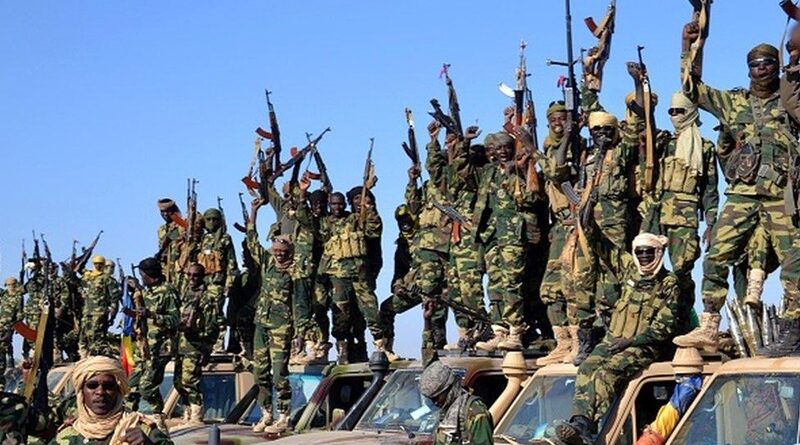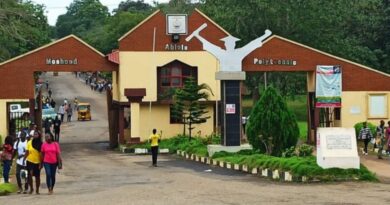New Fears of Boko Haram Return In Maiduguri
Concerns are rising over a possible resurgence of Boko Haram in Maiduguri, the birthplace of the jihadist group, despite previous perceptions that the threat had been largely neutralized.
Along the road from Maiduguri’s airport into the city, the freshly repainted walls of a girls’ college stand as a symbolic defiance against Boko Haram’s long-standing campaign against western education — a campaign rooted in the group’s name, which translates to “western education is forbidden.” At a nearby roundabout on the outskirts, three uniformed men were seen chasing a cement truck to collect a road levy, giving up under the intense 42°C heat, reflecting the low-key security presence in a city once regularly rocked by violence.
Maiduguri, capital of Borno State in northeastern Nigeria, has not suffered a major attack since February 2021, signaling a period of relative calm. However, Borno’s governor, Babagana Zulum, issued a dire warning on 8 April 2025, stating that Boko Haram was making a comeback. He cited a surge in attacks and kidnappings happening “almost on a daily basis without confrontation,” suggesting that the authorities were “losing ground.”
Governor Zulum’s warning came less than a month after Boko Haram gunmen raided two military bases in Borno and after his own security convoy reportedly intercepted an attempted ambush by the group. The exact number of casualties from these incidents remains unclear.
The Nigerian military responded, emphasizing the sacrifices being made and urging the public to appreciate their efforts. Information Minister Mohammed Idris also downplayed the governor’s concerns, asserting that Boko Haram had been “largely dissipated,” echoing the stance of his predecessor, Lai Mohammed, who in 2015 claimed the group had been “technically defeated.” Idris added, “We’re not saying that we have 100% exterminated Boko Haram, but we’ve degraded them significantly.” Governor Zulum, however, sharply criticized this view, describing the minister as “naive” about the actual security situation.
Also read: Reverend Sister Killed Over Debt in Rivers State
Boko Haram, founded in 2002 and turning increasingly violent after the 2009 death of its founder, Mohammed Yusuf, at the hands of police, has killed over 36,000 people and displaced 2.2 million. One of its most infamous acts was the abduction of 276 schoolgirls from Chibok in 2014.
Although a multinational coalition of forces from Nigeria, Cameroon, Chad, and Niger had reclaimed significant territory from Boko Haram and secured many garrison towns, the group has remained a threat, weakened but not eliminated. Boko Haram also splintered into two rival factions, further complicating efforts to eradicate them.
In January 2024, President Bola Tinubu pledged to “stamp out the remaining vestiges” of Boko Haram, Ansaru, and various bandit and kidnapping gangs, promising that “we won’t rest until every agent of darkness is completely rooted out.”
Yet, analysts report that Nigerian troops are struggling to contain jihadists in an area nicknamed the “Timbuktu Triangle,” stretching from eastern Yobe state into western Borno, mirroring the resilience once seen in the Malian city of Timbuktu.
Beyond attacks on military targets, local reports from January stated that Boko Haram and Islamic State West Africa Province (ISWAP) militants killed 40 farmers and kidnapped several others. ISWAP, having split from Boko Haram, has shifted strategies, imposing taxes on villages and remitting the funds to their commanders, effectively controlling parts of rural areas.
Also read: Benue Violence: Pastor And Wife Murdered In Militia Raid
Concerns are also mounting over thousands of displaced people who have been resettled into their home villages under government programs. As early as 2023, the International Crisis Group warned that the hasty resettlement efforts exposed civilians to danger, risking renewed jihadist influence in these vulnerable communities.
In Yobe State, the security situation remains fragile. In September 2024, 34 people were killed in an attack. In March 2025, a pro-Tinubu mediaoutlet reported that Boko Haram had issued eviction notices to villagers in Gujba for allegedly aiding the army in a battle. However, authorities dismissed the report, claiming there was “no credible intelligence” to support it.
Further destabilizing the region, Niger recently withdrew from the multinational coalition, raising concerns about intelligence-sharing capabilities after the withdrawal of French and American forces from the broader Sahel region. Although a larger regional force has been announced, it has yet to become fully operational.
Meanwhile, in Maiduguri, frustration is growing. Some residents accuse the Tinubu administration and the national security advisor of complacency and being too focused on political matters. In a local clinic, an anonymous aid worker lamented, “Everybody has forgotten Maiduguri,” as student nurses moved through the corridors.
Content Credit: Agbetan Bisola
Image Credit: bbc.com




